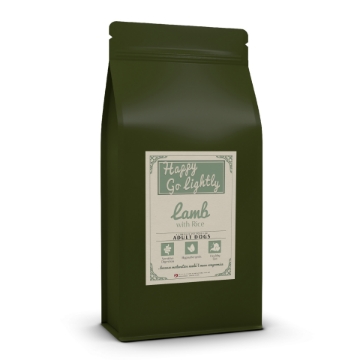Stomach Issues/Acid Reflux
Dog food for stomach issues & acid reflux
Obviously recurrent regurgitation & sickness should be assessed by a vet, but if your dog has been given a diagnosis of acid reflux then there are a few dietary changes you can make which may help.
A common sign of acid reflux in dogs is the vomiting of bile or regurgitation of undigested food shortly after eating.1 This may be due to a brief relaxation of the muscular opening at the base of the oesophagus (referred to as the sphincter), which has failed to ‘shut off’ the stomach from the oesophagus.
Not all dogs with gastric reflux will vomit or regurgitate though - some dogs will have much more subtle symptoms. Lip licking, air biting, teeth grinding or restlessness at night are often outward signs that your dog is uncomfortable because stomach acid has entered the oesophagus.
The general recommendation in these instances is to feed your dog a lower fat diet (9% or less), and to keep the protein on the lower side too. Protein can make the stomach more acidic which, in normal circumstances, is fine - but it may be tricky for an already over-acidic tum. Try feeding foods around 21% protein to see if that helps.
It should be noted that in rarer cases acid reflux can occur if the stomach is under-acidic too. In these situations, opting for a lower-fat food with a higher protein content may be more appropriate.
Lower fat foods may also be helpful for dogs that suffer with chronic gastritis (inflammation of the stomach), but again, there is no need to opt for reduced protein. Allergies can sometimes be the cause of chronic gastritis so opting for a good quality grain free, chicken free, beef free diet may also help (check your treats too!).
Happy Go Lightly (Fish & Rice)
- * Wheat free, gentle, hypoallergenic formula with strong Omega 3 content
- * Ideal for low-moderately active dogs
- * Protein: 20%, Fat: 9%, Fibre: 3%, Calories: c. 353k/cal per 100g
- * 1.5kg trial bag & 10kg sack (40kg bulk deal also available)
Happy Go Lightly (Lamb & Rice)
- Wheat free, gentle, low fat dog food with strong Omega 3 content
- Ideal for low-moderately active dogs
- Protein: 21%, Fat: 10%, Fibre: 3%, Calories: c. 348k/cal per 100g
- 1.5kg trial bag & 10kg sack (40kg bulk deal also available)
Happy Go Lightly Senior (Turkey & Rice)
- Wheat & Gluten free, gentle, low fat dog food with added joint support & l-carnitine
- Ideal for low-moderately active senior dogs. Only 8% fat & 0.7% phosphorus
- Protein: 20%, Fat: 8%, Fibre: 4%, Calories: c. 342k/cal per 100g
- 1.5kg trial bag & 10kg sack (40kg bulk deal also available)
Peptide Plus Weight Control - New!
- * hydrolysed dog food that harnesses the power of peptides
- * 90% of dogs saw an improvement in weight after 12 wks
- * helps dogs feel fuller for longer / added joint support
- * Protein: 29%, Fat: 9%, Fibre: 8.5%, Calories: c. 315k/cal per 100g
Return to Slender (Fish & Rice)
- Wheat free, hypoallergenic dog food, with added joint support & only 8% fat
- Ideal for dogs prone to weight gain. Added l-carnitine & only 0.6% phosphorus
- Protein: 21%, Fat: 8%, Fibre: 4%, Calories: c. 341k/cal per 100g
- 2kg trial bags & 12kg sacks (48kg bulk deal also available)
Happy Go Lightly (Turkey & Rice)
- Wheat & Gluten free, hypoallergenic low fat dog food that's gentle on kidneys & tums
- Ideal for low-moderately active dogs. Only 8% fat & 0.8% phosphorus
- Protein: 23%, Fat: 8%, Fibre: 3.5%, Calories: c. 346k/cal per 100g
- 1.5kg trial bag & 10kg sack (40kg bulk deal also available)
Happy Go Lightly Small Bite (Turkey & Rice)
- Wheat & Gluten free, gentle, low fat dog food with added joint support
- Ideal for low-moderately active dogs. Only 8% fat & 0.8% phosphorus
- Protein: 23%, Fat: 8%, Fibre: 3.5%, Calories: c. 346k/cal per 100g
- 1.5kg trial bag & 10kg sack (40kg bulk deal also available)
Tender Tums (Chicken & Rice)
- Wheat free, hypoallergenic dog food with only 8% fat
- Ideal for less active dogs & may be helpful for those prone to acid reflux
- Protein: 24%, Fat: 8%, Fibre: 3.5%, Calories: c. 348k/cal per 100g
- 2kg trial bags & 12kg sacks (48kg bulk deal also available)
Tickety Boo Senior/Light (Turkey, Sweet Potato & Cranberry)
- Grain Free, super-gentle hypoallergenic recipe for optimum support for senior or overweight dogs.
- Added Omega 3, l-carnitine & Joint Support & only 9% fat.
- Protein: 27%, Fat: 9%, Fibre: 3.5%, Calories: c. 343k/cal per 100g
- 2kg trial bag & 13.5kg sacks (54kg bulk deal also available)
Tickety Senior/Light (Trout, Salmon, Sweet Potato & Asparagus)
- Grain Free, super-gentle, hypoallergenic recipe that's packed with 50% fish.
- Optimal low-fat support for senior/overweight dogs. Added joint support, l-carnitine & Omega 3
- Protein: 25%, Fat: 8%, Fibre: 3.5%, Calories: c. 340k/cal per 100g
- 2kg trial bag & 13.5kg sacks (54kg bulk deal also available)










































